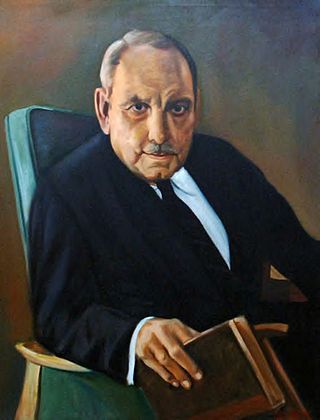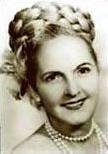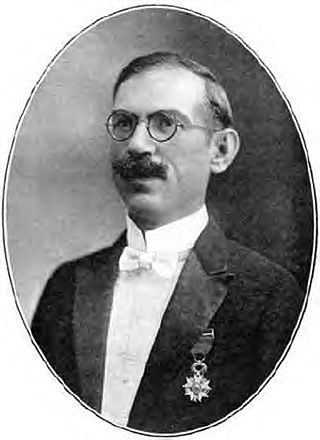
The politics of Puerto Rico take place in the framework of a democratic republic form of government that is under the jurisdiction and sovereignty of the United States Congress as an organized unincorporated territory. Since the 1898 invasion of Puerto Rico by the United States during the Spanish–American War, politics in Puerto Rico have been significantly shaped by its status as territory of the United States. The nature of Puerto Rico's political relationship with the United States is the subject of ongoing debate in Puerto Rico, in the United States, the United Nations and the international community, with all major political parties in the archipelago calling it a colonial relationship.

Carlos Antonio Romero Barceló was a Puerto Rican politician who served as the governor of Puerto Rico from 1977 to 1985. He was the second governor to be elected from the New Progressive Party (PNP). He also served 2 terms in Congress as the Resident Commissioner of Puerto Rico from 1993 to 2001.

José Luis Alberto Muñoz Marín was a Puerto Rican journalist, politician, statesman and was the first elected governor of Puerto Rico, regarded as the "Architect of the Puerto Rico Commonwealth."

Throughout the history of Puerto Rico, its inhabitants have initiated several movements to obtain independence for the island, first from the Spanish Empire from 1493 to 1898 and since then from the United States.

Antonio Rafael Barceló y Martínez was a Puerto Rican lawyer, businessman and the patriarch of what was to become one of Puerto Rico's most prominent political families. Barceló, who in 1917 became the first President of the Senate of Puerto Rico, played an instrumental role in the introduction and passage of legislation which permitted the realization of the School of Tropical Medicine and the construction of a Capitol building in Puerto Rico.

Felisa Rincón de Gautier was a Puerto Rican politician who served as the mayor of the city of San Juan, Puerto Rico. She was the first woman to be elected as mayor of a capital city in the Americas.

The Union of Puerto Rico, also known as the Unionist Party, was a major political party in Puerto Rico in the early 20th century. The Union of Puerto Rico was known as the dominant political party of the island from 1904 to 1932. UPR founder Luis Muñoz Rivera also founded La Democracia, which effectively acted as the UPR publication. On 19 February 1904, the Union of Puerto Rico party became the first mass party to advocate for independence for Puerto Rico in the form of a sovereign nation.

Félix Lope María Córdova Dávila was a political leader and judge from Puerto Rico who served as Puerto Rico's fourth Resident Commissioner in Congress and later as an associate justice of the Supreme Court of Puerto Rico.

The political party strength in Puerto Rico has been held by different political parties in the history of Puerto Rico. Today, that strength is primarily held by two parties, namely:

Partido Liberal Neto, Auténtico y Completo was a political party in Puerto Rico from 1937 to 1948.

The Puerto Rican Autonomist Party was a political party in Puerto Rico founded in 1887. The Party was founded in Ponce, Puerto Rico, and its first chairman was Román Baldorioty de Castro. He was followed by Martin Corchado, a prominent physician from Ponce. Juan Hernández López was one of the co-authors of its program in 1897.

Eduardo Georgetti, was an agriculturist, businessman, philanthropist, and politician. Georgetti, who came from a family of landowners, became one of Puerto Rico's wealthiest sugar barons and benefactors. In 1917, he became the first vice-president of the Puerto Rican Senate.

The Popular Democratic Party is a political party in Puerto Rico that advocates to continue as a Commonwealth of the United States with self-governance. The party was founded in 1938 by dissidents from the Puerto Rican Liberal Party and the Unionist Party and originally promoted policies on the center-left. In recent years, however, its leaders have described the party as centrist.

Cayetano Coll y Cuchí was a politician, writer and an advocate of Puerto Rican Independence. In 1917, he became the first President of Puerto Rico House of Representatives after the island was ceded to the United States by Spain as a result of the Spanish–American War. Coll y Cuchí was a member of a prominent family of Puerto Rican politicians, writers and educators.
José M. Dávila Monsanto was a Puerto Rican politician and lawyer who in 1938 co-founded the political party Partido Popular Democrático de Puerto Rico. He served in the Puerto Rican Senate as a representative of the PPD.

Leopoldo Figueroa a.k.a. "The deacon of the Puerto Rican Legislature", was a Puerto Rican politician, journalist, medical doctor and lawyer. Figueroa, who began his political career as an advocate of Puerto Rican Independence, was the co-founder of the "Independence Association", one of three political organizations which merged to form the Puerto Rican Nationalist Party. Figueroa, had changed political ideals and in 1948, was a member of the Partido Estadista Puertorriqueño. That year, he was the only member of the Puerto Rico House of Representatives who did not belong to the Partido Popular Democrático (PPD), and the only Representative to oppose the PPD's approval of what became known as the Ley de la Mordaza, which violated the civil rights of those who favored Puerto Rican Independence. On December 22, 2006, the Puerto Rican Legislature approved a law declaring every September 21, Leopoldo Figueroa Carreras Day.
José Tous Soto was a Puerto Rican politician and former Senator and Representative.

Law 53 of 1948 better known as the Gag Law, was an act enacted by the Puerto Rico legislature of 1948, with the purpose of suppressing the independence movement in Puerto Rico. The act made it a crime to own or display a Puerto Rican flag, to sing a patriotic tune, to speak or write of independence, or to meet with anyone or hold any assembly in favor of Puerto Rican independence. It was passed by a legislature that was overwhelmingly dominated by members of the Popular Democratic Party (PPD), which supported developing an alternative political status for the island. The bill was signed into law on June 10, 1948 by Jesús T. Piñero, the United States-appointed governor. Opponents tried but failed to have the law declared unconstitutional by the United States Supreme Court.

The Puerto Rican Reformist Party was a short-lived Puerto Rican political party. The Puerto Rican Reformist Party was founded in 1948 after the Liberal Party decided to rename themselves.













